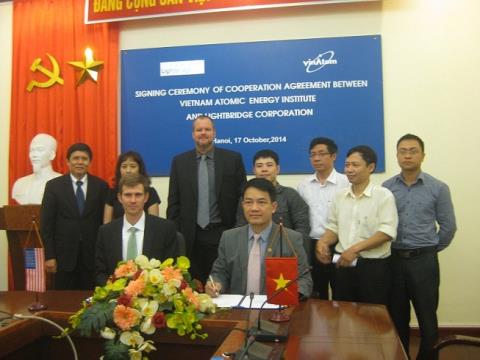

Several days after the 123 Agreement on the US-Vietnam civil nuclear cooperation took effect on October 3, the cooperation agreement between the Vietnam Atomic Energy Institute (VINATOM) and Lightbridge Corporation was signed as a first step in the implementation.
The agreement was signed by VINATOM’s director Tran Chi Thanh and Jonathan Baggett, Vice CEO of Lightbridge Corporation, in Hanoi on October 17.
Local newspapers commented that the agreement showed significant improvement in the strategic relations between Vietnam and the US.
According to VINATOM, this was the second cooperation agreement the institute had signed with the US corporations in the field of nuclear energy.
Prior to that, a cooperation agreement had been signed between VINATOM and Westinghouse Electric (WEC) on training Vietnamese engineers and workers in nuclear energy design and safe analysis at the University of North Carolina, and for training at WEC’s head office in Pittsburgh.
Vietnam still has not decided what technology it will use for the first nuclear power plant.
The signing of the 123 Agreement was described as a step to remove barriers for Vietnam to access US technologies and training.
Dr. Nguyen Nhi Dien, head of the Da Lat Nuclear Research Institute, said with the agreement signed, Vietnam would have opportunities to access source technologies and nuclear materials with no limitations.
Meanwhile, Dr. Tran Dai Phuc, a consultant to the Ninh Thuan Nuclear Power Plant project, said that Vietnam could learn from experiences from agencies and organizations in the US, including DOE and the USNRC in legal matters.
Dr. Tran Chi Thanh denied a report on CNN on October 17 that US-based Lightbridge will design and choose the nuclear reactors and materials as well as set up nuclear safety procedures.
Thanh also said that Lightbridge Corporation had no plans to build a $500 million nuclear research center for Vietnam.
Thanh said the only news related to the $500 million sum was a project to build the Center for Nuclear Energy Science and Technology CNEST with a preferential loan of $500 million to be provided by the Russian government.
“There has been no cooperation between Vietnam and the US on the establishment of a nuclear center. The cooperation between the two sides, to date, has been in training only,” Thanh said.
Vietnam plans to build 10 nuclear reactors by 2030. The Vietnam-US Nuclear Agreement will pave the way for the US corporations to join the Vietnamese market worth $10 billion. It is expected to be worth $50 billion by 2030.






- Hanoi honors outstanding faces in innovation, digital transformation
- Land deed digitization accelerated in Hanoi
- Vietnam's capital boosts iHanoi usage by citizens
- Technology, innovation identified as key drivers for Hanoi's growth
- Hanoi intensifies efforts to achieve its digital goals by 2025
- Second Hanoi Technical Innovation Contest launched
